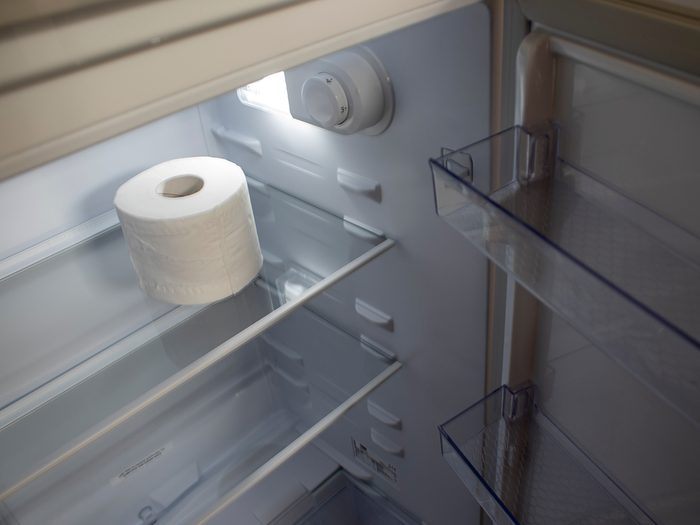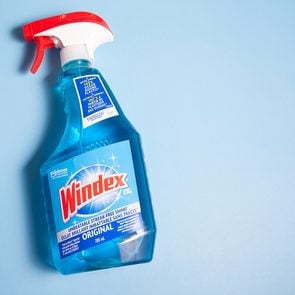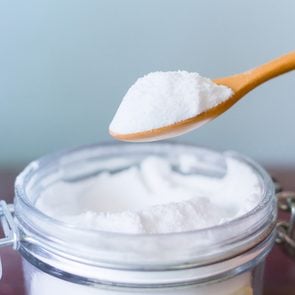Why Are People Putting Toilet Paper in the Fridge?

Have you heard of this trend? We'll explain how it works and let you decide if it's worth trying out for yourself.
Social media is an amazing thing. It lets us communicate with people all over the globe, spreading idealistic goals, offering support and encouraging each other to put toilet paper in our refrigerators.
That’s right. Recently, people on social media are advising you to replace that box of baking soda in the back of your fridge with a roll of toilet paper.
Does this weird trick work? We asked kitchen and appliance experts to see what the pros had to say!
Why Put Toilet Paper in the Fridge?
Ruiz Asri, editor of Honest Food Talks, says toilet paper’s absorbency is behind this hack. “Moisture in the refrigerator often contributes to mildew and unpleasant odour,” Asri says. The toilet paper absorbs excess moisture, along with foul smells, Asri says.
References to toilet paper in the fridge can be found as far back as 2015. But the dedicated use of it as an odour absorber seems to be more recent, primarily in the last year or so, with videos appearing on TikTok and Facebook.
Does It Work?
Yes—to a point. While it will absorb odours, other options are more efficient, take up less space and generate fewer odd looks from house guests.
We spoke to one person who’s tried the TP technique. Amy from AmyandRose.com had some fishy smells in the fridge, and her daughter suggested that she try the toilet paper hack. So did it work?
“In my experience, somewhat,” she says. But here’s the catch: it’s just a temporary fix.
Alternative Fridge Odour Busters
So if you want something longer-lasting that takes up less space, here are some alternate odour fighting strategies:
Baking soda
Baking soda is the go-to solution for most households. It caught on in the 1970s, when manufacturer Arm & Hammer promoted it as an environmentally friendly alternative to chemical cleaning. By 1994, the Los Angeles Times reported “more refrigerators are likely to have baking soda than working light bulbs.”
Baking soda is a base material, which means it neutralizes acids. Because most odours are acidic, it can cut off the smell at the source. (Side note: After deodorizing a fridge with baking soda, don’t use the contents of that box for baking. Cooking can reactivate those acids and contaminate your cake.)
As the baking soda interacts with more acids, it becomes less effective. Most people will need to replace it every three months.
Black cumin seed oil
Corinne Segura, a building biologist practitioner and founder of My Chemical-Free House, has first-hand experience with fridge odours.
“When food went bad in my fridge, it left a lingering foul odour,” she says. “I used black cumin seed oil, which has a deodorizing effect to clean up the smell.”
Segura credits this to the essential oil’s ability to deodorize methyl mercaptan, a chemical that produces a rotten scent.
“I mixed five drops of black cumin essential oil with one tablespoon of dish soap and applied it in a thick layer to all the plastic components inside the fridge,” she says. “I let it sit for two hours before washing it off. This worked well to get rid of foul odours in the fridge.”
Activated charcoal
Activated charcoal captures the particles that cause bad smells, just like toilet paper. It’s available as a powder, in pre-cut filters or as fabric you can cut to size.
It functions by collecting the volatile compounds given off by smelly items, reducing odour. Swap out the charcoal every month or so to keep it effective.
Vanilla extract
For those who prefer a more pleasant scent, especially around their food, Asri offers a particularly sweet recommendation. “Soak a cotton ball in vanilla extract and place it in the refrigerator,” he says. “This combats bad odours and leaves your fridge smelling like a bakery.”
UV light purifier
If you gravitate toward high-tech solutions, consider a fridge with a UV light filter. This comes from Alexander Hill, a sales rep for United Kingdom-based The Appliance Depot.
“Ultraviolet light can destroy bacteria, moulds and other pathogens,” says Hill. “Some fridge purifiers use UV light to sanitize the air and surfaces inside the fridge, thus reducing the source of many odours.”
Refrigerators like the Samsung Bespoke line offered UV deodorizing filters as an option since 2021, while other brands feature UV filters on in-door water dispenser lines.
Hill says these filters are particularly useful for large refrigerators or persistent trouble areas, where passive odour absorption might not be enough. Electronic purifiers, he says, also reduce bacteria and mould, leading to a fresher and potentially safer food storage environment.
Crumpled newspaper and charcoal
If you want a deep clean on your fridge or freezer at minimal expense, go with one paper product that’s even cheaper than toilet paper. Fill up a particularly stinky fridge with crushed charcoal and crumpled newspaper. You’ll need to replace the newspaper every day for about a week, but it’s a low-cost way to deal with a foul-smelling situation.
Take that, toilet paper.
Next, check out 13 cleaning hacks that take the hassle out of housekeeping.






